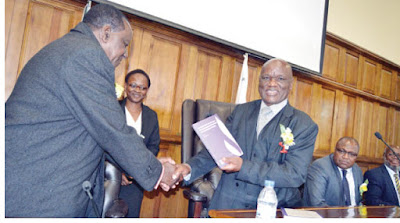Chief Justice Luke Malaba has reaffirmed that the country’s
judiciary is independent and everyone including the executive is answerable to
the rule of law.
He made the remarks while delivering the inaugural public
lecture at the Great Zimbabwe University (GZU)’s Herbert Chitepo Law School in
Masvingo yesterday.
The theme of the lecture was “ Superior Courts and The
Consolidation of The Rule Of Law” The chief justice hailed GZU and its Vice Chancellor,
Professor Rungano Zvobgo for establishing a law school and naming it after a
luminary, the late first black lawyer and national hero, Herbert Chitepo.
Justice Malaba urged practicing lawyers to emulate the late
legal icon to achieve a society based not on exploitation but on equality.
He said the judiciary must not be a “prisoner of influences
in the execution of its duties. It must be immune to external pressures and
influences.”
The chief justice said the crafting of the new constitution
in 2013 was a giant step towards safeguarding a truly independent judiciary by
strengthening both institutional and individual independence.
“In its classical formulation, the rule of law entails that
every citizen and every institution is subject to the law,” said Chief Justice
Malaba.
“This includes the courts, the executive and the lawmakers.
In simpler terms, it is characteristic of a democratic society that those to
whom the power of governing is entrusted can only act under and within the
authority of the law.”
He said the rule of law is the guiding principle under
which the country was founded.
“It follows therefore that no one should be above the law,
regardless of their political, economic and social standing. This also means
that the law should be applied uniformly and equally to all,” said the chief
justice.
He also said the law was cognisant of the clear separation
of powers between the Legislature, Executive and Judiciary.
“Such independence is crucial to the impartial application
of the law and a cornerstone of the rule of law. In this regard, the courts are
the machinery for the attainment and consolidation of the rule of law in the
country,” said justice Malaba.
Government, he said, should ensure that laws are published
and open to all who wish to read them. “This also connotes that court
procedures must not be complex to the extent of causing any hindrance. The
courts are the cornerstone of the constitutional democracy and the protection
of the rule of law in the same manner that
Parliament is the hallmark of representative government.
The courts, in particular the Constitutional Court, are subject only to the
law,” he said.
Justice Malaba said the courts must also take into
consideration relevant historical, economic, social, cultural and political
contexts and interpret the Constitution in a manner that advances the rule of
law and contributes to good governance.
He said the Constitutional Court has made decisions that
have had far-reaching impact on the rights of persons.
Turning to legal practitioners, Chief Justice Malaba said
they were inseparable with the judiciary in the matrix of upholding the rule of
law.
“The courts are the vanguard of the troops striving to
uphold the rule of law and legal practitioners are similarly indispensable foot
soldiers in the crusade,” he said.
The Herbert Chitepo Law School opened its doors in 2014 and
its first graduates are expected to be capped early next month by the
university’s Chancellor President Mnangagwa.
Present at the lecture were the Ministry of Youth, Sport,
Arts and Recreation permanent secretary Dr Thokozile Chitepo who is also the
late national hero’s daughter, GZU pro-vice chancellor, Dr Andrew Chindanya,
Masvingo High Court Judge Justice Garainesu Mawadze, Masvingo High Court
registrar, Mrs Renika Dzikiti, Judicial Service Commission (JSC) secretary, Mr
Walter Chikwanha and Herbert Chitepo Law School dean Mr Victor Nkiwane, among
others. Chronicle









0 comments:
Post a Comment